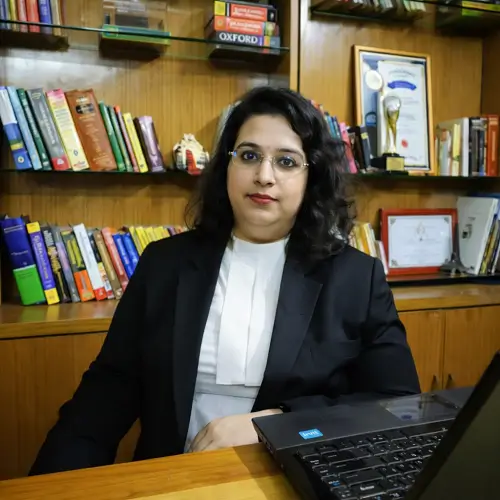

CERTIFICATE COURSE ON WOMEN’s RIGHTS
4.8 (461 Rating)
₹1000
Schedule
- Duration: 4 Weeks
- Frequency: Two classes per week
- Total No. of Classes: 10 (Including Orientation and Concluding Session)
Important Dates
- Last Date to Apply: 4-Feb-2026
- Course Start Date: 5-Feb-2026
- Course End Date: 8-Mar-2026
Note: Participants will be evaluated through assignments, case analyses, and a final project that involves proposing legal strategies to address a specific women’s rights issue in the Indian context.
About The Course
This certificate course, on Women’s Rights, offers a comprehensive exploration of women’s rights in India and globally. It covers the historical and contemporary context of gender inequality, analyzes constitutional and legislative frameworks, and examines international conventions impacting Indian laws. The curriculum includes in-depth studies of domestic violence, workplace harassment, reproductive rights, and family laws. Participants will also explore the challenges women face in the legal profession and develop strategies for effective advocacy. The course integrates theoretical knowledge with practical applications through case studies, research papers, and a final project, aiming to empower participants to analyze and advocate for women’s rights critically.
Comprehensive Exploration of Women’s Rights: Study women’s rights within both Indian and international legal frameworks.
Focus on Gender-Based Issues: Analyze key topics like domestic violence, workplace harassment, and reproductive rights.
Practical Learning Approach: Engage in case studies, research projects, and advocacy strategies.
Real-World Application: Apply theoretical knowledge through research projects and a final project focused on real-world women’s rights issues.
Note: This module is designed to be interactive, allowing participants to engage in discussions, case studies, and practical exercises to enhance their understanding and application of women’s rights in the legal landscape, both nationally and internationally.
Aims & Objectives
Comprehensive Understanding: Explore women’s rights in Indian and global contexts, focusing on historical and contemporary challenges.
Critical Analysis & Advocacy: Develop skills for analyzing gender issues and advocating for women’s rights.
Legal Frameworks: Study constitutional provisions, key legislations, and international conventions impacting women’s rights.
Empowerment & Development: Equip participants to address gender biases and advance equality through advocacy and legal strategies.
Course Curriculum:
Class 1: Orientation Session
Class 2: Understanding Gender Inequality
Class 3: Legal Frameworks for Women’s Rights in India
Class 4: Domestic Violence and Legal Responses
Class 5: Sexual Harassment at Workplace
Class 6: Reproductive Rights
Class 8: Women in the Legal Profession
Class 9: Advocacy Strategies for Women’s Rights
Class 10: Concluding Session
Note: Participants will be evaluated through assignments, case analyses, and a final project that involves proposing legal strategies to address a specific women’s rights issue in the Indian context.
Who Should Apply?
This course is open to anyone interested in learning about women’s rights. There are no restrictions based on age, gender, education, or background.
Mentors
Advocate Chadha is practising in the Delhi High Court.
She is a 3rd generation lawyer with excellent and in-depth experience.
She is excellent in advisory and litigation of Civil, IBC, Matrimony, Family, Cheque bounce, and Succession.
Impaneled with leading companies and institutions.

Mr. Pranav Jha
Mr. Pranav Jha was serving as a Junior Research Consultant at the National Human Rights Commission. He has completed his LL.M (Access to Justice) from Tata Institute of Social Sciences, Mumbai.
He has graduated in Law- {B.A.LL.B (Hons.)} with distinction from Aligarh Muslim University, Murshidabad Centre (W.B). He has been very dedicated to his academic excellence. He was a student representative at CDFC, TISS.
Perks
- E-Certificate on Completion
- Internship Opportunity
- Letter of Recommendation
Contact Us
- Call: 9458479236
- Mail: contact.lra24@gmail.com
- Address: D2, New Friends Apartment, Sir Syed Nagar, Aligarh, Uttar Pradesh, India. Pin-202001.
- Our testimonial
Our Satisfied Students
Certificate Course on Women’s Rights – Online Legal Certification | ₹1000

A 4-week online certificate course covering women’s rights, gender justice, constitutional safeguards, and legal remedies with expert mentorship and certification.
Course Provider: Organization
Course Provider Name: Legal Research and Analysis
Course Provider URL: https://legalresearchandanalysis.com
Course Mode: Online
Course Workload: PT10H
Start Date: 2026-Feb-5-
End Date: 2026-Mar-8
Duration: PT10H
Repeat Count: -0.01
Repeat Frequency: Weekly
Course Type: Paid
Course Currency: INR
Course Price: 1000
4.8






